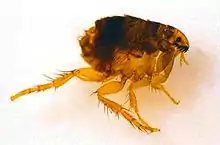pulga
Asturian
Etymology
From the hypothetical Vulgar Latin word *pulīca, from Latin pūlex (“flea”).
Galician
Etymology
From Old Portuguese pulga, from the hypothetical Vulgar Latin word *pulīca, from Latin pūlex (“flea”),
Portuguese

pulga
Etymology
From Old Portuguese pulga, from the hypothetical Vulgar Latin word *pulīca, from Latin pūlex (“flea”), from Proto-Indo-European *plúsis (“flea”).
Pronunciation
Synonyms
- púlex, pulgo, púlice, sifonáptero
Derived terms
- antipulgas
- pulga atrás da orelha
- pulga-comum
- pulga-d'água
- pulga-d'anta
- pulga-de-água
- pulga-de-anta
- pulga-de-areia
- pulga-do-mar
- pulgão-branco
- pulgão-lanígero
- pulga-penetrante
Spanish
Etymology
From Old Spanish pulga, from the hypothetical Vulgar Latin word *pulīca, from Latin pūlex, ultimately from Proto-Indo-European *plúsis.
Pronunciation
- IPA(key): /ˈpulɡa/, [ˈpulɣa]
- Hyphenation: pul‧ga
Noun
pulga f (plural pulgas)
- flea
- (colloquial, US) flea market
- Synonyms: mercado de las pulgas, rastrillo, mercadillo
Derived terms
- tener malas pulgas
- pulgoso
- pulguiento
- pulguicida
This article is issued from Wiktionary. The text is licensed under Creative Commons - Attribution - Sharealike. Additional terms may apply for the media files.